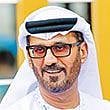Artificial Intelligence part and parcel of UAE schooling: minister
Minister of Education says events like First Global Challenge inspire youth to lead

Dubai: Using Artificial Intelligence (AI) to solve real-life problems has become part of the UAE education system, the Minister of Education said on the sidelines of the ‘First Global Challenge 2019’ in Dubai on Saturday.
Hussain Ebrahim Al Hammadi said students in grades 11 and 12, in schools following the ministry’s curriculum, “tackle real-life problems with their solutions and innovations” learned through the ‘Creative Design and Innovation’ subject, which teaches AI and related sciences.
His comments came against the backdrop of the Challenge at Festival Arena, where over 1,500 students from 191 countries are competing to convince judges that their AI-powered robot would be the most efficient in cleaning up pollutants from the oceans.
Starting young
Al Hammadi told Gulf News the UAE regards AI as an essential subject, the idea and elements of which are taught since kindergarten through the ‘Design and Technology’ subject. Students learn the basics of coding “and start thinking about solving [real-life] problems”.
Issues we face, like ocean pollution and climate change, are global issues that need to bring all of society together.

As the students progress through higher grades, the subject continues to “strengthen and deepen” till grade eight. In grades nine and 10, students learn the latest programming language – currently Python – and complete applied projects as part of the Computer Science subject.
Continuing journey
The “climax” comes in grades 11 and 12, where student teams use a “holistic approach”, including AI, to solve problems.
Al Hammadi added that the UAE recently – on October 16 – launched the Mohammad Bin Zayed University of Artificial Intelligence (MBZUAI), the first graduate-level, research-based AI university in the world.
Knowledge economy
“We will see the huge impact this university will have in enabling highly-skilled Emiratis and expats – and anyone from around the world who has the capability and the skillset – to do their masters and PhD [at MBZUAI]… This will create momentum and industry in the UAE based on the latest technologies, to bring us where we want to be, as part of the knowledge economy,” Al Hammadi said.
Abdul Aziz Al Jaziri, Deputy CEO and Chief Operations Officer, Dubai Future Foundation, which has organised the Challenge in Dubai, said AI is indispensable to the UAE’s ambitions.
“The leadership of the UAE believe AI and robotics go hand-in-hand – from the first appointment of our Minister of Artificial Intelligence, the UAE Strategy for AI, and even the birth of the Dubai Future Foundation,” Al Jaziri, an Emirati, added.
He said it was also essential to involve the youth in the process, including through events such as First Global Challenge.
Global issues
“I think issues that we face, like ocean pollution and climate change, are global issues that need to bring all of society together – not just government, private sector, or academia. What we see here [at First Global Challenge], what its founder [Dean Kamen] has said, is that when we look at the Olympics, we’re bringing people at the top of their game, but they’re going to retire after the Olympics.
“But every youth here, from 191 countries, are going to start their first journey into robotics and automation from here. In 20 years, they will be the CEOs, the Chief Technology Officers, the leaders of tomorrow, and their first stop is Dubai,” Al Jaziri added.
‘Most wanted’
Members of the UAE team at First Global Challenge said they were proud to represent their country and learn about the latest developments in technology from the event. Shouq Saeed said AI is the “most wanted major” in the UAE, which she plans to study at university after graduating from grade 12.
Shaikha Ali, who is in grade 11, said the subject is the “future of my country… I also want to study IT; so robotics will help me in my major”.
The First Global Challenge ends on Sunday with an awards ceremony of the winners.



